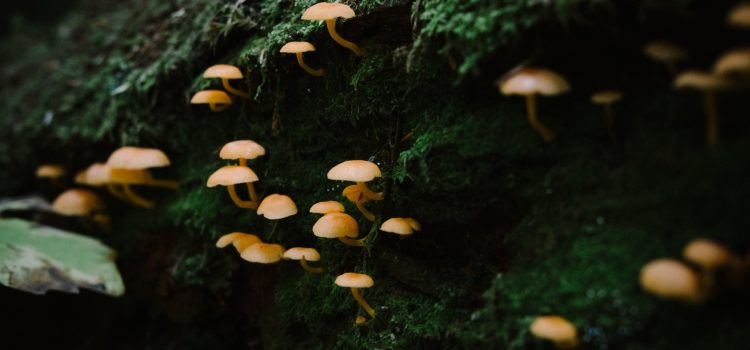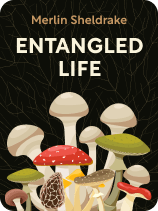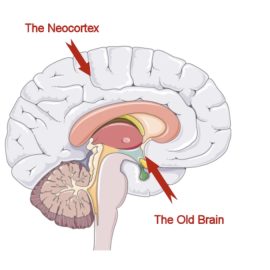

This article is an excerpt from the Shortform book guide to "Entangled Life" by Merlin Sheldrake. Shortform has the world's best summaries and analyses of books you should be reading.
Like this article? Sign up for a free trial here.
What’s the importance of fungus? How do humans depend on fungi?
Merlin Sheldrake’s book Entangled Life argues that it’s important to further invest in mycology. With fungi, plants stay hydrated, we challenge our ideas of intelligence, and we have advanced solutions to mental illnesses.
Continue reading to learn why fungi are important for all life forms.
#1: Fungi Expand Our Imaginations
Sheldrake explores the importance of fungus by beginning with the fact that fungi expand our imaginations, pushing us to consider new ways of thinking about ourselves, other people, and non-human beings. Here, we’ll explore two concepts that fungi challenge us to question: individuality and intelligence.
Concept 1: Individuality
Sheldrake claims that we tend to think of an organism as an individual contained within the borders of its flesh. The concept of individuality presumes that being physically separate makes organisms independent actors. For instance, because you’re assumed to be an individual, you’re legally responsible for your choices.
Concept 2: Intelligence
Fungi also challenge us to question our ideas about intelligence. According to Sheldrake, we typically define intelligence based on whether a living thing possesses a brain. Creatures like humans and dogs are intelligent, and creatures that lack brains (like fungi) lack intelligence.
However, Sheldrake claims that fungi exhibit a behavior that we typically associate with intelligence: decision-making. For instance, as we explored earlier, fungi use their hyphae to gather sensory input, then they respond by changing how they grow—either toward or away from stimuli. Sheldrake calls this a decision because fungi use the information they’ve gathered from sensory inputs to choose one course of action (such as growing toward a stimulus) over another (such as growing away from it). In calling this type of decision a form of intelligence, he references the Latin roots of the word intelligence, which means “to choose between.”
#2: All Life Depends on Fungi
According to Sheldrake, all life on Earth depends on fungi. For example, fungi support life in the following ways:
Supporting plants: Nine out of 10 plants depend on the mycorrhizal fungi living in their roots. Without these relationships, plants would struggle to stay hydrated and nourished. (Shortform note: Recent research reveals that mycorrhizal fungi are able to serve this role because their hyphae host bacteria that help these fungi access nutrients and send them into plant roots.)
Holding the soil together: Underground networks of tightly woven mycelia hold the soil together. Without mycelia, rainwater would strip the land of its soil. (Shortform note: In addition to preventing erosion, underground mycelia also help the soil retain rainwater. By “gluing” soil particles together, mycelia essentially create a dense, three-dimensional maze that slows the rate at which water travels through the soil.)
Preventing the buildup of dead matter: Fungi decompose dead matter. Without these decomposers, forests would be buried under mile-high mounds of dead plant matter. (Shortform note: Although other types of organisms decompose matter, many of them depend on fungi to break down matter first. Many species of fungi are called primary decomposers because they’re often the first to begin breaking down this plant matter. Next, secondary decomposers such as beetles and nematode worms feast on the “pre-chewed” matter.)
#3: Fungi Offer Solutions to Modern-Day Problems
In addition to continuing to serve their roles supporting plants, soil, and the cycle of life, fungi can also be used to address modern-day problems. According to Sheldrake, the more time and resources we invest in studying fungi, the better we’ll be able to solve pressing problems. In this section, we’ll focus on fungi’s potential to address two of these problems: mental illness and environmental destruction.
Problem 1: Mental Illness
According to Sheldrake, there’s strong evidence that psilocybin mushrooms—also known as magic mushrooms—can effectively treat mental illnesses such as depression and anxiety. These mushrooms naturally contain psilocybin, a psychedelic compound. Human use of psilocybin isn’t new: Many indigenous cultures have used it (and continue to use it) for spiritual traditions and medicine. However, the scientific study of psilocybin is relatively new—most studies have been conducted in only the past several decades.
Problem 2: Environmental Destruction
Finally, according to Sheldrake, fungi have the potential to reduce environmental destruction and rehabilitate areas devastated by environmental disasters. People are already using fungi for these purposes, and Sheldrake argues we should continue investing resources in finding fungal solutions to environmental problems. Here, we’ll explore three ways people are using fungi to solve environmental issues.
Mycoremediation: This is when fungi digest and break down human messes, from chemical spills to trash heaps. For instance, in Mexico City, a white rot fungus feasted on mounds of diapers, reducing their starting mass by 85%—and producing edible, disease-free mushrooms in the process.
Mycofiltration: This is when a dense mat of mycelium is used to filter contaminants out of water.
Mycofabrication: This is when mycelia are used to create building materials, packaging, and textiles that replace less environmentally-friendly materials such as wood, plastic, and leather.

———End of Preview———
Like what you just read? Read the rest of the world's best book summary and analysis of Merlin Sheldrake's "Entangled Life" at Shortform.
Here's what you'll find in our full Entangled Life summary:
- An examination of what we know and don't know about fungi
- How fungi can help solve many modern-day problems
- The three most important benefits of fungi






